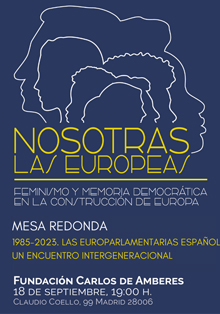Jesús González Mateos
Editor of Aquí Europa and Canal Europa
As every year, the start of the European political year takes place in Strasbourg, in the European Parliament, where the President of the European Commission, Ursula von der Leyen, has presented the state of the Union to the MEPs. A political agenda that continues to be marked by the war in Ukraine and a legislature that is entering its final stretch and is trying to close the pending dossiers before the European elections in June 2024.
She did not clarify whether she would be a candidate for re-election, but her words oozed future, something that does not sound like someone who is retiring.
She defended the achievements of the European Green Pact, but stressed the need to temper it with reindustrialisation and the defence of European companies’ ability to compete.
And while he cited the war in Ukraine and Putin’s war crimes, neither in gesture – last year he wore the colours of the Ukrainian flag with matching pin and ribbon, this year it is all gone – nor in substance did he wish to focus his words on the conflict. Rather it was China that took the place of the EU’s great future enemy.
Reading between the lines
The first thing that the speech and subsequent parliamentary debate on the state of the Union has made clear is that it is already election time in Europe. Von der Leyen, who in previous years had been committed to the social democratic position in the European Parliament, has made a subtle shift towards her centre-right political family.
She made almost no mention of the EU’s social pillar, but emphasised the importance of industry, business and competition, with clear protectionist messages.
Similarly, without abandoning her defence of Ukraine, she took more than half an hour to mention the issue, while she was much harsher and more specific in her criticism of China for the multiple battlefronts that the EU has with the Eastern power: trade dumping through public aid, the purchase of rare earths and critical materials, the unethical use of AI and a long etcetera.
Likewise, his words on the ecological transition undoubtedly show a clear concern for the pace at which measures to combat climate change are being implemented and the negative impact they are having on industrial sectors and agriculture, for whose professionals he had words of gratitude for their work during the pandemic and now the war.
Enlargement as a historic challenge
The end of his speech was forceful and much less convoluted than the rest of his words. It is clear that the enlargement debate has crept surprisingly and expressly into this end of the legislature.
In this context, the President did not avoid the subject and has fully embraced the historic obligation we have to complete the European project with the accession of the Western Balkan states and the countries threatened by Russian annexationism – Ukraine and Moldova.
Aware of the difficulties of governance that the process may entail, she has put the bandage before the wound by instructing the Commission’s services to analyse the problems that these accessions may pose for the Community framework. But she has not hesitated to state that, if the EU Treaties need to be reformed for this purpose, she is prepared to propose it.
In short, Von der Leyen believes that we must deepen the unity of the 27, but that at the same time we are obliged to enlarge the European Union to more than 30. Perhaps his speech is the best summary of the state of health of the European Union and where it can go in the medium-term future.
© EditoRed / All rights reserved






